These kittens grew up together and are now going to be little mamma cats. They often just laze around together, but today Luke was particularly affectionate with Leon. I suppose their names should be changed to Lucy and Leona, because the boys are girls as it turns out and as you can see, they are both very pregnant and due to have babies any day now. I wonder if they will kitten share? What do you think?
|
Luke and Leon again… These kittens grew up together and are now going to be little mamma cats. They often just laze around together, but today Luke was particularly affectionate with Leon. I suppose their names should be changed to Lucy and Leona, because the boys are girls as it turns out and as you can see, they are both very pregnant and due to have babies any day now. I wonder if they will kitten share? What do you think?
0 Comments
Smokey had her babies in one of the abandoned cars in the bush, but she and the babies are nowhere to be found now. Smokey is a smart cat and either she has them well hidden or the fox found the litter. Smokey has not been seen for over two weeks, the last time just after she had given birth.
Luke and Leon, as well as Smokey, were supposed to be males. Well, I guess the folks they came from and I are not up on cats, because none of us knew that they were all females, not males. So this spring, when Smokey went into heat, I cringed and thought of another litter of unwanted kittens. I was also relieved because Luke and Leon were not related to her. But then Luke and Leon also went into heat. The neighbour across the highway keeps an in tact male cat, but he is the only one around. It does only take one. So, very soon, Luke and Leon, who are very bonded to the house and stay home all the time, will have their babies. They sleep together in the dog house, now the cat house and may even share it with their litters and share the kittens, as happens rarely, but does happen. Smokey was a great cat and I do hope she is safe and her babies are growing and well. The Fat Ewe Farm will soon have abundant free kittens, if anyone is interested. Meow! I think the raven is knocking off the goslings every morning. Out of 17, there are only 4 left. They are protected by 5 adults, and I do see some missing feathers on the ground where the adults have tried to protect the babies, but with no luck. So the roast goose is not going to be roast goose after all. And the Muscovy ducks were sitting on fourteen eggs, but only hatched one little gaffer who is not even a Muscovy. He is likely a Saxony cross, or because he is small, a Khaki Campbell bred by the white drake. He does have two mothers to look after him and Muscovy ducks can be vicious with their sharp claws. Hopefully he will make it. Only one Muscovy made it last year from a hatch of seven.
As far as the chickens sitting on nests, the same thing happened. Too many eggs sat on by too many hens in one nest results in some eggs getting cold and then dying. When I cleaned out the Muscovy nest, all the eggs were rotten and ready to explode. I broke them so they did not, and oh what a terrible smell. It was coming right through the shell by today and the ducks abandoned the nest finally, when this little guy was out. One other duckling hatched, but did not make it for some reason. The lone goose egg had a gosling about three quarters of the way done that had died in the shell, likely from getting cold. So the coop was moved today and the big one will be moved tomorrow if it does not rain (looks like it will tonight for sure). The silly chickens do not know where to find their coop. It is within their vision and still was broad day light, but they circled round and round where it used to be looking for it. I gave up trying to herd them towards it and went in for the night. It appears that those great hatches are not so great after all. Don't count your chickens before they are hatched is true enough, but with the raven around, maybe do not count them at all? After so much rain for the past month, with the ground being muddy soup everywhere and the mosquitos and flies more prevalent because they can breed so quickly, today was a sunny day, finally. But it was super hot, 27 degrees Celcius, or almost 81 degrees Fernheit. The heat was one thing, but the humidity was the other.
After the morning chores I settled down for coffee and breakfast, though breakfast never really arrived. I could hear a little kid goat crying and crying and the goats had been getting through the old fence in the weak spots, so I thought I should investigate. Sure enough, they had busted through again. An old tree had fallen on the wire giving them a clear path to the other side where it is always better than the side they are supposed to be on. So, I heaved and hoed and finally moved the log, pulled the wire up, got a stick and propped it up like a post to rest the wire on and went back inside. But that kid kept crying and I went out to find him. He was stuck on the right side of the fence this time because the goats that were out were ushered through the main gate and back to their pen leaving him behind. Robbie and I went in the bush and led him back to where he could find his way home. Kids these days, really. I went back in to have breakfast and realized I had not seen Georgie, the crippled lamb, go out with the rest, so we went to look for her. She was nowhere in sight and I hoped she would be found by night, but Robbie and I searched the bush, especially where we found her last night, and had no luck. Poor Georgie. Wherever she is, I hope she makes it through until morning. There are many predators in the woods and the dogs do their best, but she cannot run at all, so would not fare well. Bless you little sweetheart baby girl. Stay safe until morning light. I went out to do a little gardening, however the humidity was unbearable and sweat was pouring off me. Staying in the sun was not an option. I got two rows of mulching done and decided to go inside. I had long given up on breakfast and decided two fresh mangos from the case I bought yesterday would be a tasty treat. I answered some emails and did not too much for a while during the hottest part of the day, went out and cleaned the water bowls and refilled them. The ducks and geese foul the water as soon as it is poured and the goats especially do not like to drink dirty water. There are 5 ducks sitting on nests and a Saxony building one that already has 7 eggs, so soon to be 6 sitting ducks. The Ancona built a nest and began her sojourn today and the Rouen ladies began several days previously. I don't think the Saxony is far behind. That will be a lot of ducklings, if they all survive. Something has been picking off the goslings, the raven perhaps, so we are down to 14 from 28, half. The other Muscovy duck not sitting has her nest ready to go and is all huffy, but I gave her 14 Guinea eggs to hatch because there are plenty of ducklings already under way, including the other two Muscovies who are sitting on their own eggs. It was a quiet hot and muggy day with not much production, but some days are just like that. Now, time to hit the hay. Goodnight and Bless you all. Sweet dreams. Things have been a little tough at the Fat Ewe Farm for the last two months. The spring was really late, with winter just not wanted to leave and then the rain came and it definitely has not left. The corrals have not gotten cleaned because every time I try, the skid steer gets stuck in the muck. The sheep pen was mostly cleaned and it is a disaster, a mud pit, simply gross, so perhaps it is best that the others did not get done. Standing on rotting hay is still better than standing in mud.
Grey days of nonstop rain can get depressing, especially when there are a zillion summer chores waiting to be done. The granaries need painting, the deck needs staining, the porch needs to be finished, the farm store needs to be done, and on and on. These are summer jobs that require decent weather since the farm has no large building to work in when it rains. The old barn was let go by the former owners. I will not understand why they did so little maintenance here. Replacing the roof would have saved the barn for another fifty years or so. The roofs on the houses were replaced last summer, thank goodness. Anyhow, being grateful for one's entire situation is not easy. Where does one find the peace, love and joy in incessant mosquitos biting, flies in hoards because they can breed in the wet bedding, no sunny days, wet animals with pneumonia, and mud everywhere that gets inadvertently tracked inside? I need to only look into the angelic face of my little lamb, Anna, and my heart is again full, or see the proud new mother with her brood of twelve newly hatched chicks, or look into the trusting eyes of my beautiful dogs and I am reminded how blessed I am. I am the caregiver once again, the mother to all who depend on me here, albeit most have four legs. I rescued little Georgie from the bush today. She had given up and hid under a log, hoping for safety. Being a cripple, her mother no longer waits for her as she did when she was new. Georgie cannot possibly keep up with the others and she cries. Robbie found her and I picked her up and carried her back to the sheep pen, quite a distance, and put her with her mother. How could I not be grateful for Georgie? And so amidst the disheartening situations and bad weather, there are always reason for joy. Looking into the eyes of the Silkie chick, those curious black eyes and that stick up hair do, one has to laugh. The Creator must have had a wonderful exhilarating time making all these creatures. It is just up to us to take a better look and find a deeper understanding to love it all, the beautiful and the problems, for all is One. The goatees are done kidding for this year, thank goodness. One of the animals above is not a goat. Can you spot him?
There were 7 dead babies this year, more than I could imagine, but apparently it is not an unusual aspect of raising Angora goats. Contributing to the problem, the rain and cold temperatures resulted in at least three of the weak babies with pneumonia. Two Bit is missing and I suspect he died in the bush and has not been discovered. He was the weakest, smallest triplet of Sherri and was being bottle fed to supplement his needs since he was always pushed aside by his stronger siblings. The little fellow on the right is half French Alpine and half Angora. Unfortunately for him and for most of the bucklings, their fate is for meat purposes. There were not many doelings born this year, but a few will be kept for breeding. Three new Nigerian Dwarf goats were first time mothers and two were decent mothers, but the third abandoned her babies. Angoras are very poor mothers as well and I will debate for the next six months whether to continue the Pygora/Nygora breeding project or not. I am in the process of procuring a Nigerian buckling with blue eyes and a registered Pygmy buck. Although I have not milked any of the goats, there are several with excellent udders and they would be excellent milk goats. One thing for sure though….the goaties are adorable, even the grown ups, and the kids are amazingly cute. If it was a more for sure thing, I would not hesitate to breed the other Angora buck again. At any rate, the Angora girls will be bred by the Pygmy buck for sure. No more pure Angoras on this farm, thank you! 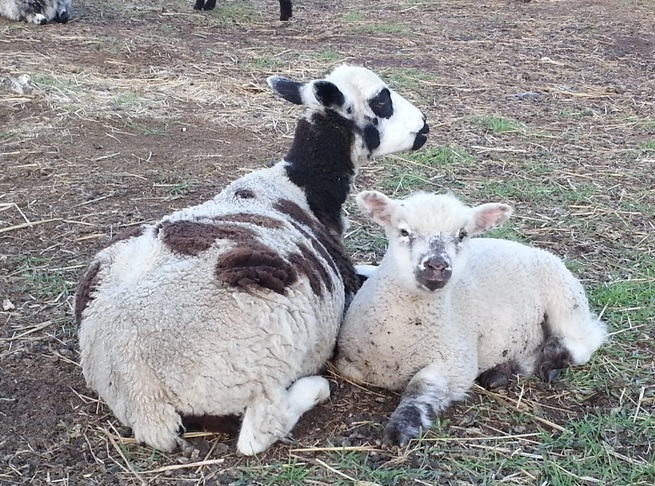 The little ram, Friar, was busier than he appeared to be last winter. He was put in with the ewe lambs, and the other Babydoll Southdown ewes. Three of the ewes did conceive but the other did not. One had a lamb that was too large for her and it died being born, but the other two, Anna and Johnston are well and lively. But Little Red, a very tiny Icelandic, Shetland and a little Barbados cross, had a Babydoll lamb, and two of the Jacob ewe lambs also had Babydoll lambs, so there are five of them in total. They are cute, cute, cute! but not as cute as little Anna, the lamb for which I was the midwife and her mother rejected. Maybe I should not take up midwifery if it drives the mothers away? I am planning to continue with the Babydoll Southdowns and Jacobs only and the crosses are amazingly adorable too. Next year, the Jacob ewes will have a new ram if I find one, so they will all be bred Jacob. The Southdowns have extremely fine downy fleece that stays relatively free of vegetative matter because it is so tight. Jacobs have fine fleece as well and I am curious as to what the cross fleece will be like. I guess I will know in the spring next year. In the meantime, I am enjoying those teddy bear lambs immensely, they are so sweet. 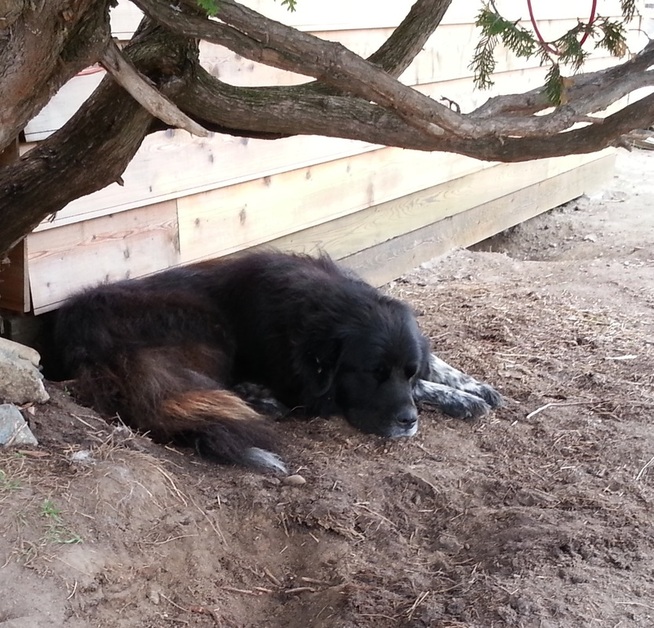 There are seven dogs at The Fat Ewe Farm, six of them livestock guardian dogs and one border collie. Ofcharka is two years old, but something went wrong at the end of winter and his fur began to thin out and his hair change colour from the beautiful shiny black to coarse white and brown. He is lacking in minerals and vitamins. The dogs were primarily fed raw meat and bones and all of them fared very well, but Ofcharka, so now they also are fed dog food. I suspect the meat and bones are not the healthiest cuts and there is simply not enough nutrition available. Ofcharka needed more. He will not cooperate to get to the vet's or he would have been there long ago. He would not let me brush him and he definitely would not allow me to shave him. I believe he has a bacterial or fungal skin infection. First he must get healthy, so he has all he wishes of the balanced diet dog food. The only problem with dog food is it includes some genetically modified ingredients, which are not good for any living animals, however; with seven dogs, the organic dog food is not in the budget. I was able to brush Ofcharka in two tries and remove some of the matted stinking downy clumps exposing more skin. That will help. I will try to pour 3% hydrogen peroxide on him which will kill the fungal infection, but he is not know to be very cooperative when it comes to any treatments. Giving him a pill or a shot is impossible. Even hidden in a snack, he will spit out a pill and eat the snack. He would have to be tied and muzzled in order to really treat him. So, the steps are small with the dog food and raw meat diet and brushing. Once most of the old fur is removed, I will attempt to treat his skin. Then when he is well again, hopefully that beautiful shiny black fur will return. I love that dog. 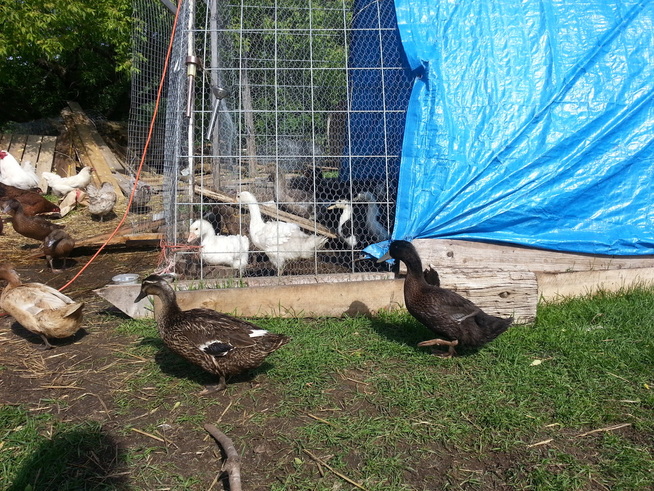 The handsome duck on the right is a Muscovy/Rouen cross, but will be sterile. The door is open and the ducks are able to come out, but so far only four exited their comfort zone. The rest were finally taken out by hand and I bet they will not want to go back. The handsome duck on the right is a Muscovy/Rouen cross, but will be sterile. The door is open and the ducks are able to come out, but so far only four exited their comfort zone. The rest were finally taken out by hand and I bet they will not want to go back. The ducklings and 4 goslings began their lives in the granary, along with the chicks. Two goslings were flown in from Ontario from Performance Poultry and are Sebastopol Geese, fluffy ruffled white gentle geese. They are quite rare and hard to breed, therefor expensive, but oh, so pretty. I am hoping the gander will cross breed the geese and produce coloured Sebastopols, which are equally pretty, but not all will have the ruffled feathers. There are some Muscovy cross ducks, which are sterile mules. Although the Muscovy can breed the North American ducks, the offspring crosses cannot breed, so are for meat. They are supposedly very meaty and tender with less grease than a regular duck and a larger carcass. There are two white ducks, the progeny of the white Khaki Campbell and it looks like a regular Campbell. Six Magpie, black and white ducklings were part of the order from Performance Poultry, and truthfully, I cannot tell them apart from the Ancona ducks. There are also a good number of pure Khaki Campbells and Rouens and three Rouen ducks are sitting on their nests of 9 - 14 eggs each, so there will be lots of Rouen ducks. It is odd, but the breeds tend to stick together and although the drakes will sneak over to the other girls, the hens stay with their own for the most part. The door was open and there is a ramp out, but the ducklings did not exit en masse. Only 4 left the coop and the others had to be taken out, but boy, once out, they were in Heaven. They played in the water and ate all the grass they desired. Tomorrow, after cleaning their coop and relocating it, I will move the livestock panels around it to create an outdoor run, put some netting on it and let the chicks out of the granary. The youngest ones still gravitate to the heat lamp, though they really do not require it. It is just their comfort area. There are several hens sitting on eggs too, so there will be some chicks hatched from the mamma hens. It was a good day for the ducklings, though, because they are finally free! 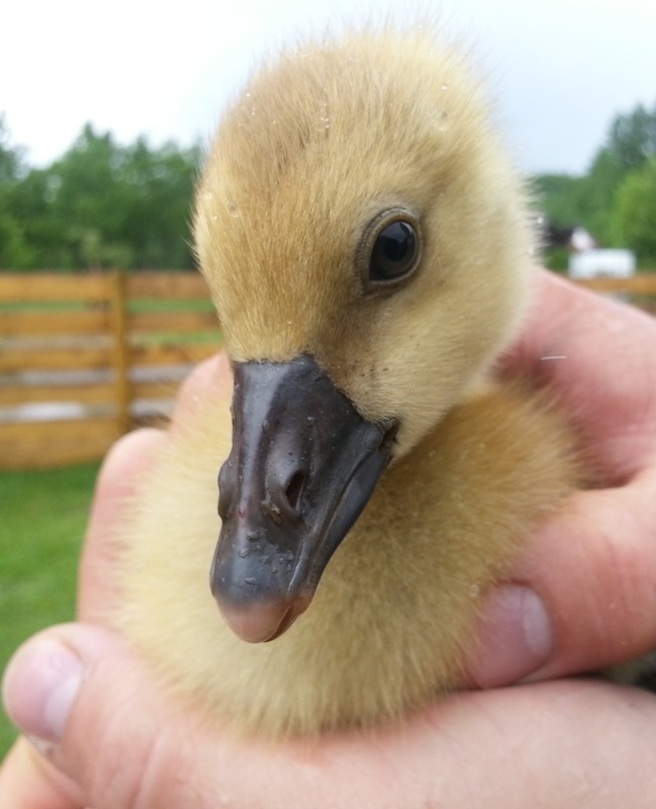 Toulouse, Embden, Pomeranian Saddleback cross gosling. Toulouse, Embden, Pomeranian Saddleback cross gosling. The Fat Ewe Farm has lots of goslings this year. The eggs that were in the incubator did not hatch, but boy, the mothers have had no problems hatching them. There are three nests hatched so far, with two more to go. There are 7 left out of 11 in one gaggle and 13 out of 17 in the other, which is actually two together. Baby geese are quick to follow their parents and aunts and uncles around and are agile and smart, unlike turkey poults. Both turkeys lost all their babies, 10 and 5 respectively. But, the turkeys had only the mammas to look after the babies. The geese have two parents and extended family to care for the little ones. What happens when these geese grow up? Some will be sold unsexed, since I have no idea what the sexes are until they start to mate. There is a way to tell, best when they are first out of the egg, but I am not about to catch those babies and turn them upside down and look. Depending on the hatch numbers of the next two nests, there will be a lot of little goslings running around. Fortunately, they mostly eat grass, with bugs and worms as a protein supplement, so they feed themselves. I have had to feed the ones hatched in the incubator, goslings and ducklings, twice daily otherwise. Soon, I will liberate them though, since they are mostly feathered, and they can forage as well. There are now three Rouen ducks sitting on nests of nine to ten eggs, so there will be more ducklings too. The geese that are not sold as young adults will be taken to the butchers for winter roast goose. People do not eat much goose around here. It was always my father's favourite, preferring it by far to turkey, which he said was dry. I do enjoy roast goose too, and the young geese at the season's end are in prime condition, grass fed and tender. It is not that I set out to raise geese for meat, but that is the choice given at the end of summer since no farm needs 30 geese! Young goose sells for $50 per goose, if anyone would like to preorder. Hint hint. |
Categories
All
AuthorFluffy writes daily about the experiences on the farm and with the bed and breakfast patrons. Archives
October 2020
|

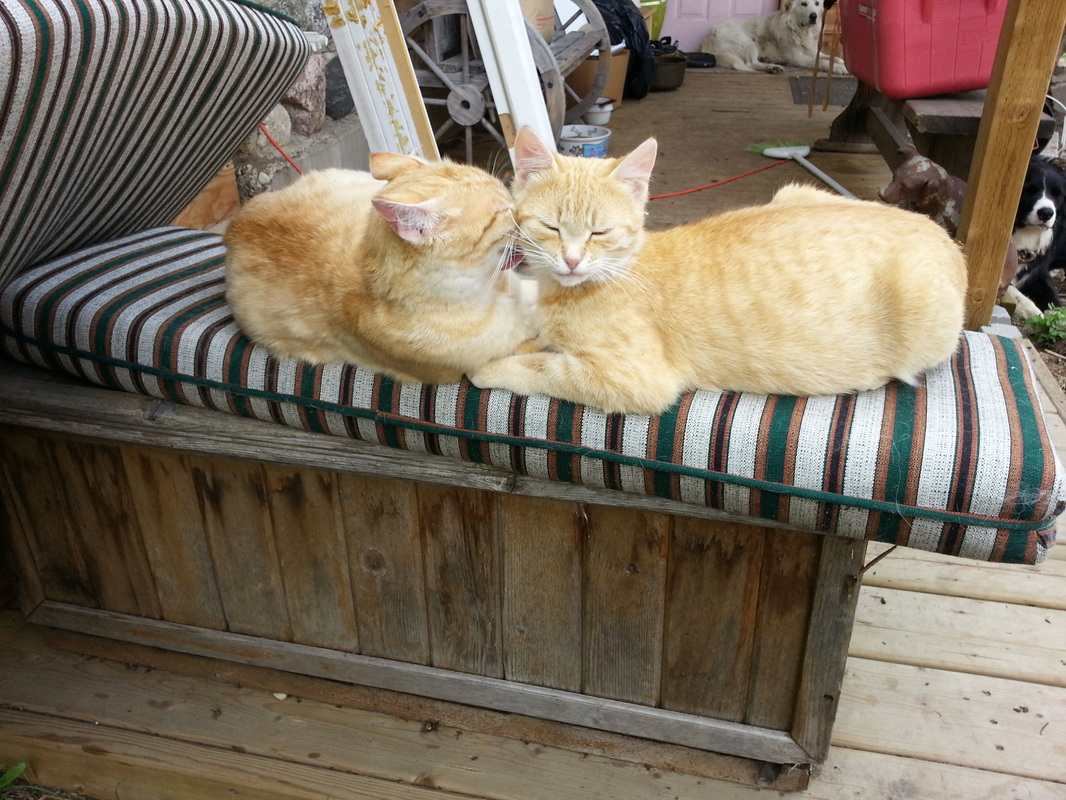
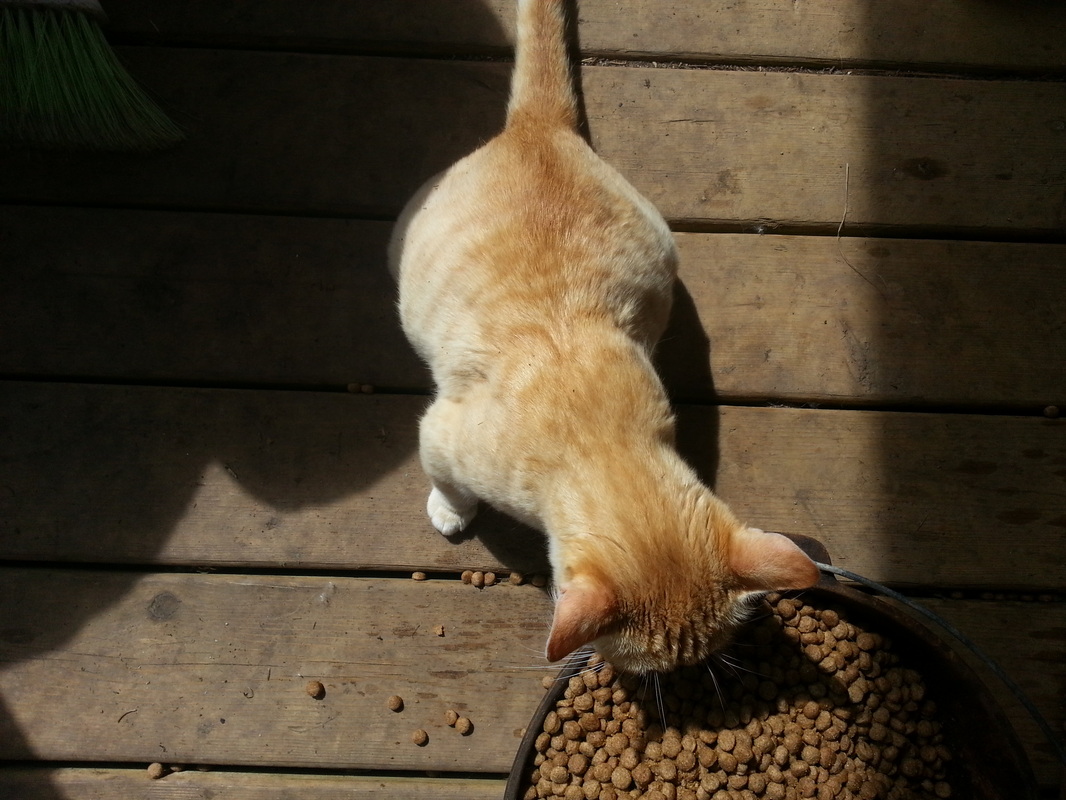
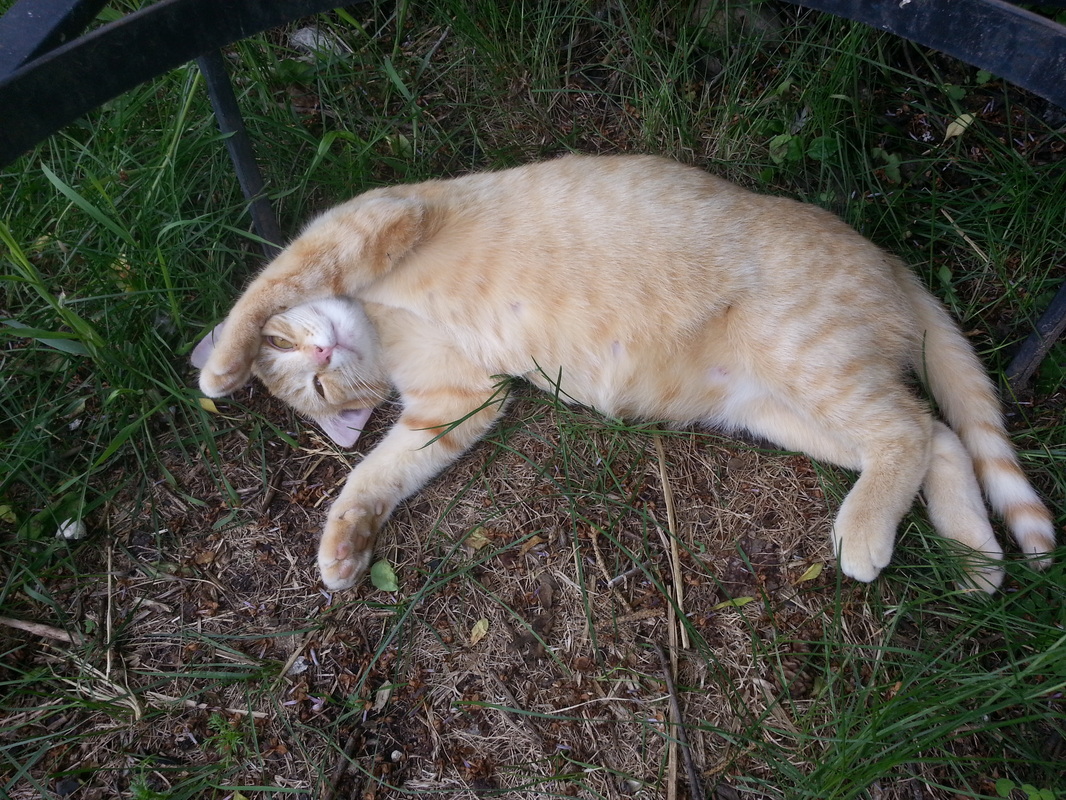
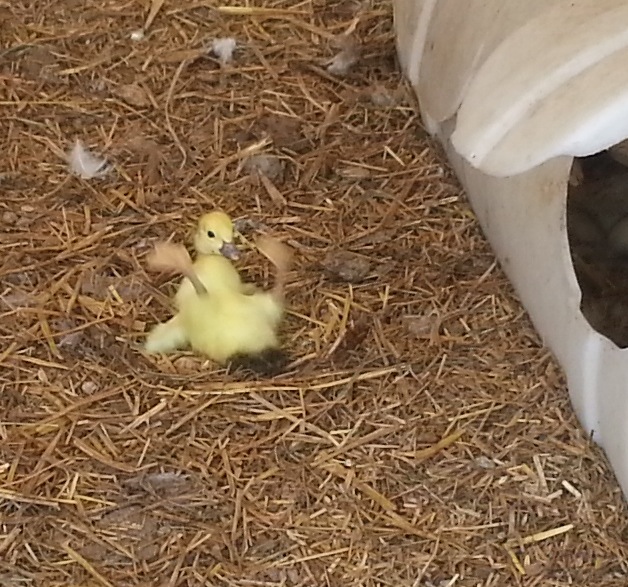
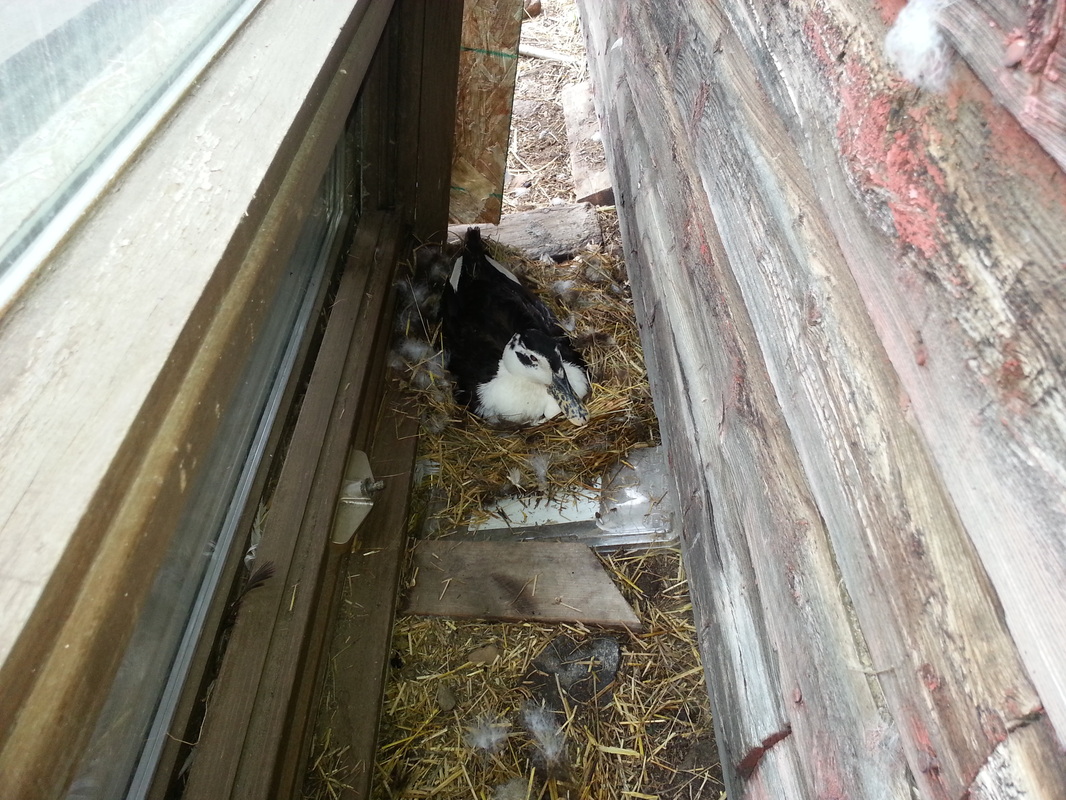
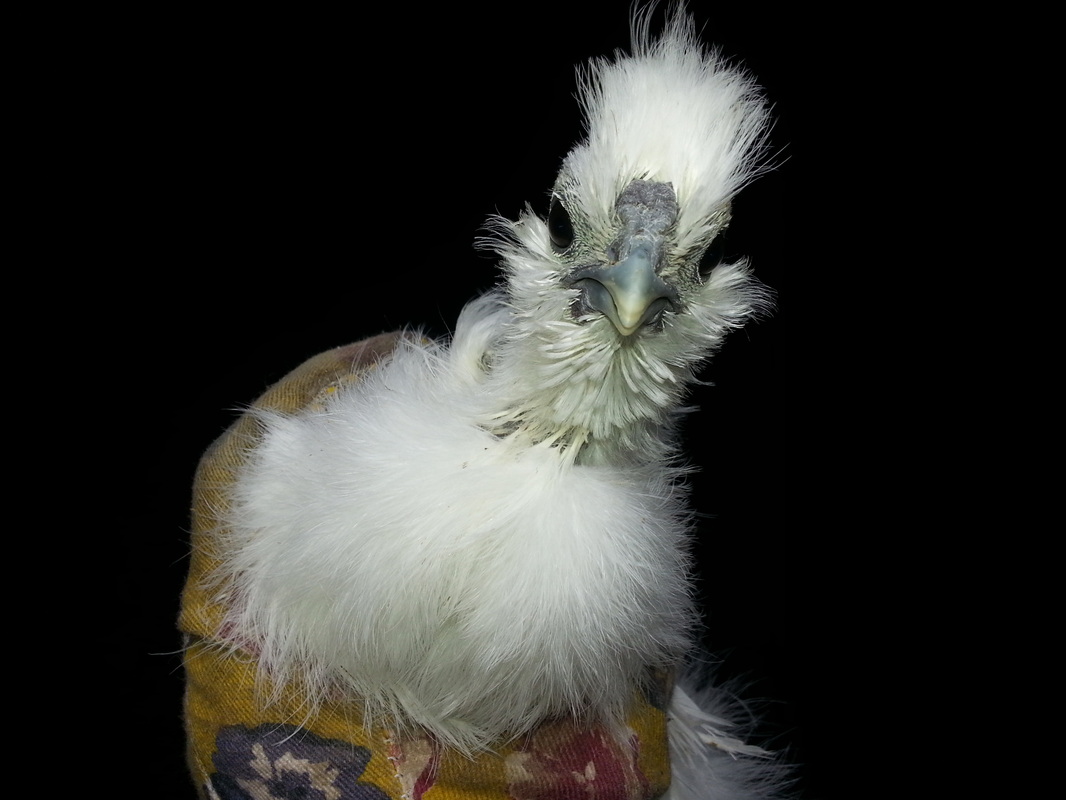
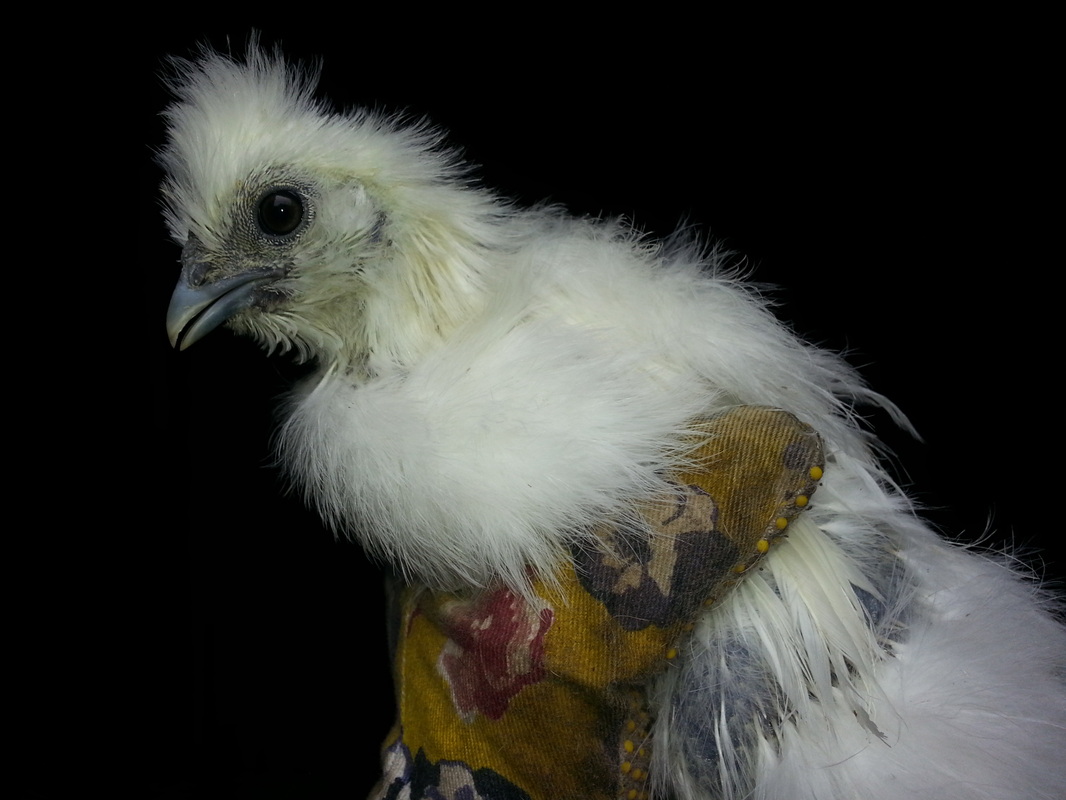
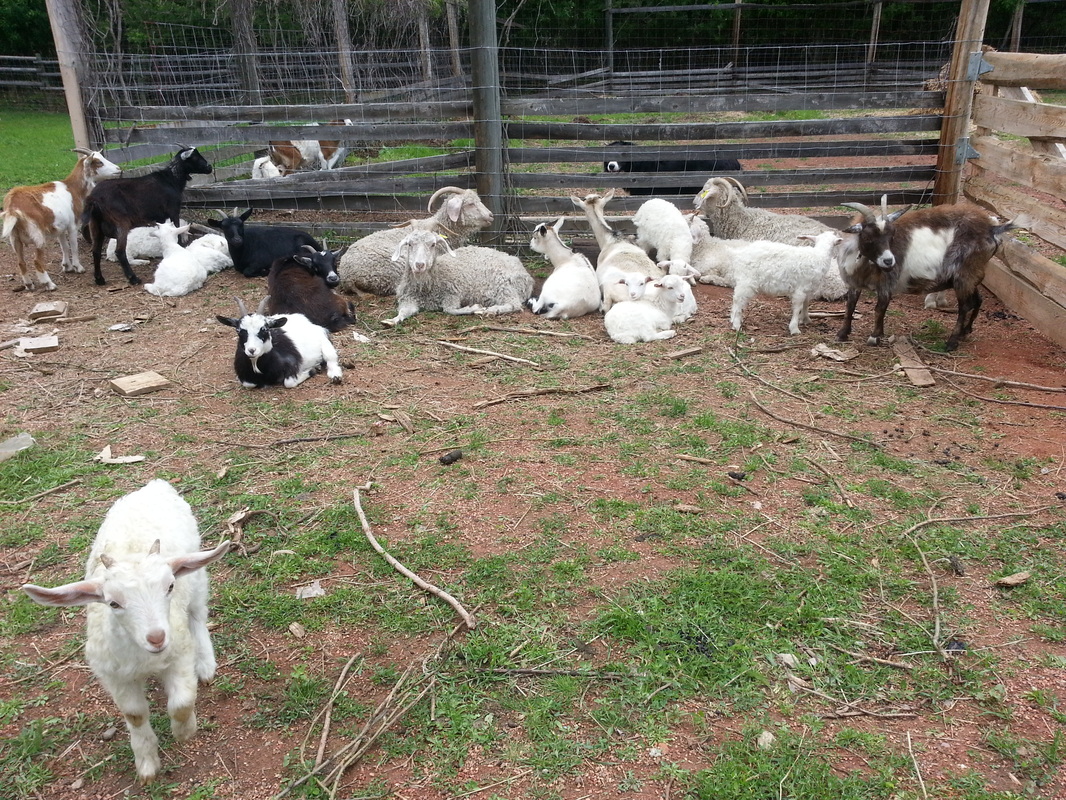
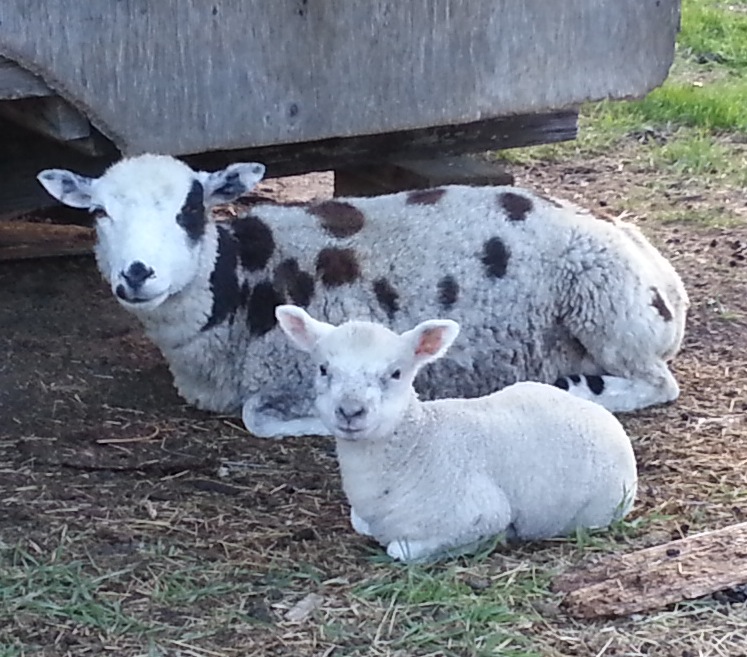
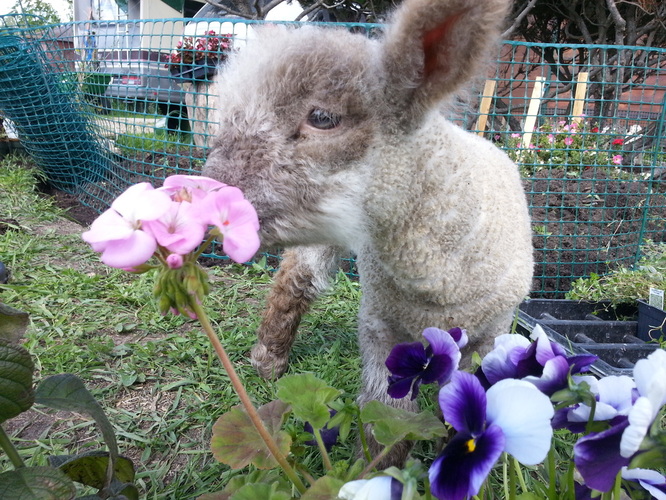
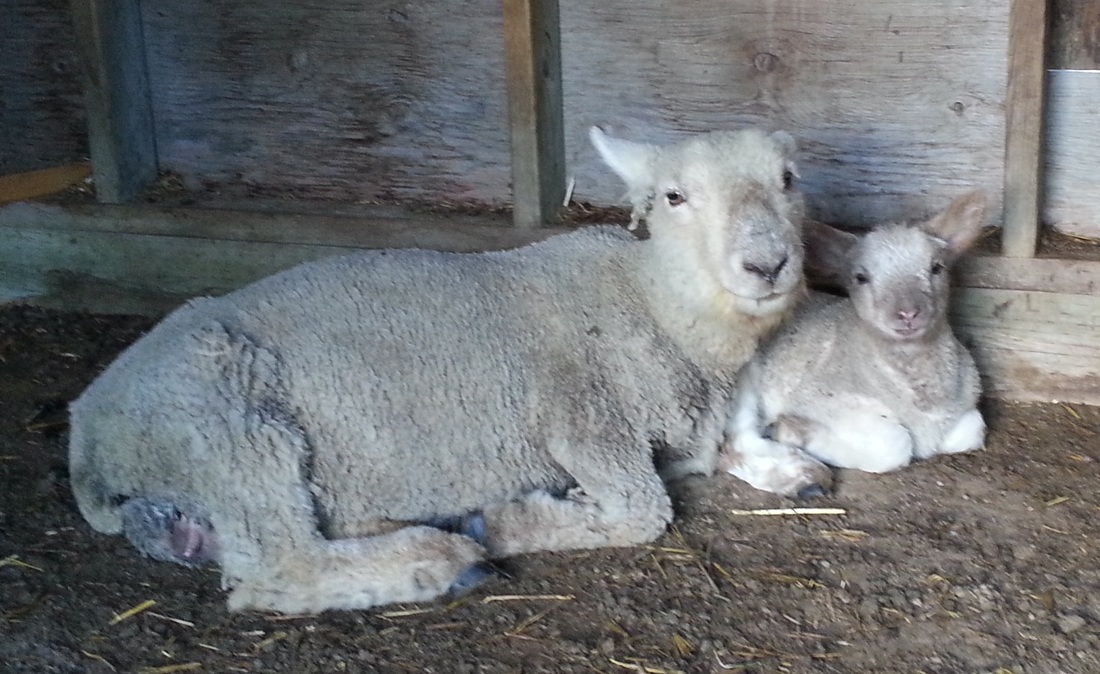
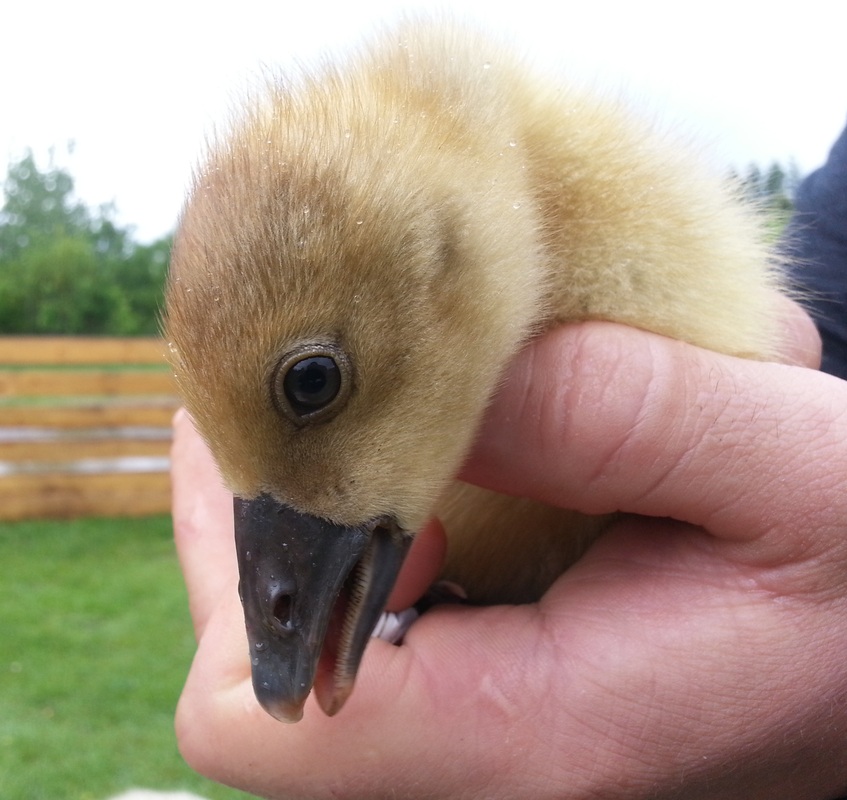
 RSS Feed
RSS Feed